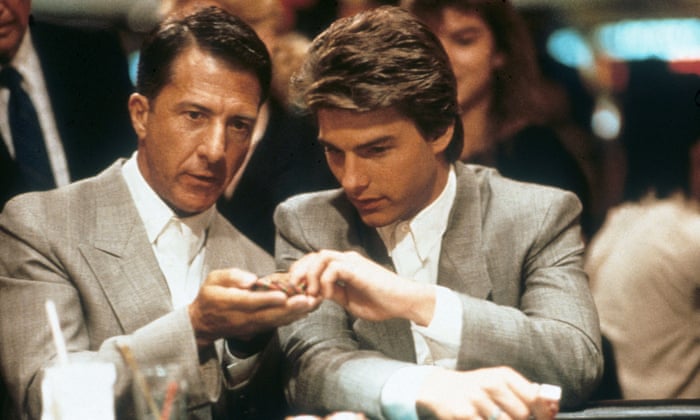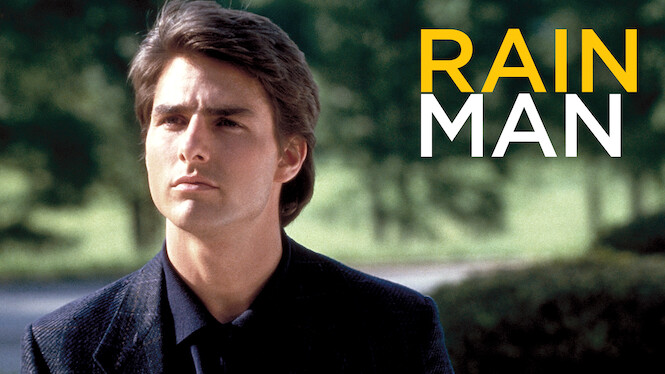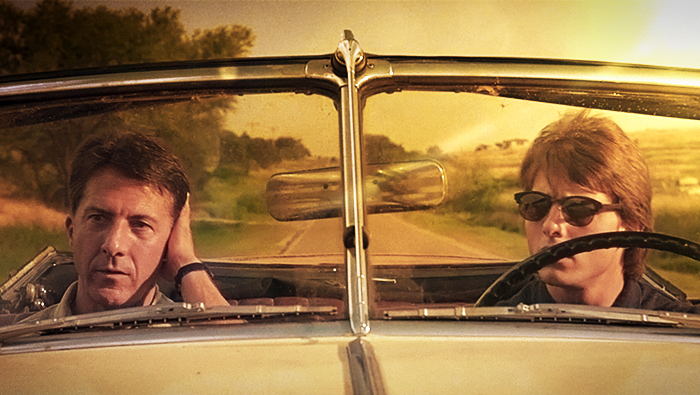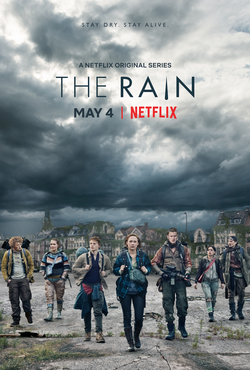A look back at the movie Rain Man and how our views of autism have changed
Por um escritor misterioso
Last updated 12 abril 2025

A look at a classic film’s depiction of autism and that developmental disability’s subsequent treatment three decades later By Nils SkudraI first watched Rain Man, a 1988 cult classic film starring Tom Cruise and Dustin Hoffman, when I was much younger and in the early stages of finding out more about the nature of autism after having learned that I was diagnosed with Asperger’s Syndrome. I saw the movie again this past weekend, and watching it for the second time made an indelible impression on me with respect to its portrayal of autism and the enormous strides that have been made in our knowledge of autism in the 30 years since Rain Man's release.The film opens with Charlie Babbitt (depicted by Cruise in one of his finest performances), a narcissistic and selfish young wheeler-dealer in Los Angeles who is struggling to resolve an impending crisis for his car dealership over its failure to comply with EPA standards. While trying to extract himself from the descending financial bedlam, he decides to take a vacation to Palm Springs with his girlfriend/employee Susanna (ably portrayed by Italian actress Valeria Golino), who has innumerable difficulties in her relationship with Charlie due to his refusal to share important personal details and his failure to really listen closely to her concerns. However, upon suddenly learning of the death of his estranged father, Charlie abruptly changes course for Cincinnati in order to attend the funeral with the preeminent desire to discover what inheritance he may have been left. To his bitter chagrin, Charlie discovers that he has only inherited his father’s prize rosebushes and fancy but antiquated automobile while the estate’s net worth of $3 million has been placed in a trust fund for an anonymous benefactor. After pulling some strings with a banker, utilizing his polished skills at conning, he learns that the lucky recipient is none other than Raymond Babbitt (played by Hoffman), an autistic individual who turns out to be Charlie’s older brother. The funds have in fact been entrusted to a trustee who oversees their distribution to the Walbrook Institute where Raymond lives. A treatment facility for people with mental and developmental disabilities, it has been home for at least 20 years to Raymond who is arguably moderately high-functioning but still unable to really care for himself and all that entails.Having been previously unaware of his brother’s existence, Charlie is incredulous to discover that despite having inherited $3 million Raymond simply has no understanding of the concept of money. In addition, the director Dr. Bruner and Raymond’s ward attendant Vern inform Charlie about the significant social challenges that Raymond struggles with as a person with autism, including a tendency to repeat certain statements over and over; difficulty with making eye contact; an extreme sensitivity to touch; a specific set of rituals and routines he is accustomed to which cannot be disrupted; and high anxiety which he suppresses by continually rocking back and forth or reciting the lines “Who’s on first, what’s the guy’s name on second base?” – lines from an old Abbott and Costello show. Having no prior understanding of autism, Charlie concludes from all this that Raymond is a “retard,” and in his determination to ensure that he obtains his share of the inheritance he essentially kidnaps his brother, taking him along for the ride without securing the permission of Dr. Bruner. Although Raymond replies “Yeah” when Charlie asks if he wants to accompany him to Los Angeles, he is unable to process the actual import of the question, and consequently once he leaves the Walbrook grounds he repeatedly insists on going back since his departure obviates his regular routines. The ensuing road trip is a journey filled with humor but also with extreme aggravation. Due to his self-centered personality and lack of understanding about autism, Charlie displays a cruel insensitivity toward Raymond’s challenges throughout the early part of the voyage. In one particularly funny scene, Raymond walks in on Charlie and Susanna having sex, the concept of which is foreign to him, and imitates their private vocalizations as he watches TV in their room. Since this would normally be considered a violation of privacy, Charlie becomes very incensed and aggressive, insulting Raymond and telling him that the sounds he heard are none of his business, prompting Susanna to abruptly leave in protest of this treatment. In another scene, when Charlie and Raymond are in a diner about to order breakfast, Charlie loses patience as his brother keeps insisting that “maple syrup is supposed to be on the table before the pancakes,” grabbing Raymond by the neck and scolding, “Don’t act like a fucking retard!” As their road trip progresses, Charlie is forced to grudgingly adjust to Raymond’s particular idiosyncrasies, frequently being pushed to the breaking point of his frustration. In a hilarious moment after they leave a motel in Missouri, Raymond repeatedly insists that they go to Kmart in Cincinnati to buy underwear despite the fact of having been given a fresh pair by Charlie since he is accustomed to wearing clothing from that particular store. This prompts an aggravated Charlie to stop the car in the middle of a backcountry road and get out and start screaming, “What difference is it whether underwear is from Kmart or not?! Underwear is underwear!” In the audio commentary, director Barry Levinson remarks that although Charlie is the ultimate con man, “the autistic can’t be conned with a good kind of sales talk,” and this scene comically illustrates that point. Gradually Charlie begins to form a bond with Raymond after learning that he was in fact the “Rain Man” who Charlie had previously only thought to be an imaginary childhood friend who comforted him during the years of Charlie’s turbulent relationship with his father. In addition, following his observation of another meltdown in which Raymond begins screaming and hitting himself in panic at the sight of hot bathwater running, Charlie realizes that Raymond was institutionalized because of the fear that he might harm Charlie with his unpredictable behaviors. Furthermore, he comes to recognize Raymond’s intellectual skills, which include a keen attention to detail, an eidetic memory and mathematical genius (reflected in the diner scene when he is instantly able to count the exact number of toothpicks that have fallen on the floor), as assets to Charlie’s goal of winning enough money to resolve his business’ financial difficulties. This plays out in a Las Vegas casino where Raymond counts the poker cards with such consistent accuracy that he and Charlie come under suspicion of using illicit techniques in order to win. Nonetheless it proves highly effective, enabling Charlie to win over $86,000 before he is told by the casino management to leave the state for his alleged illegal activity. Ultimately, however, as Charlie is further exposed to Raymond’s erratic nature, he is forced to weigh the prospects of whether Raymond’s well-being is best served by having him live in an outside world where he is significantly vulnerable or by returning him to the Walbrook Institute that would provide him with care while keeping him in a sheltered existence. The film’s strengths include the superb performances by all of the cast members, especially Cruise and Hoffman in the lead roles, and its portrayal of the intellectual benefits and social challenges associated with autism. The ability to focus very narrowly on and excel in a topic of specialization, having an eidetic memory, and astute attention to detail and organization are highly desired qualities in the workplace, and in the present time many employers are specifically seeking job candidates on the autism spectrum because of their possession of these particular skills. At the same time, the film also captures with striking accuracy the sensory difficulties and high anxiety levels that accompany autism’s positive aspects. Raymond’s challenges at processing the import of certain statements exemplify this point since he consistently replies “Yeah” to questions that have significant ramifications for his life without making an actual distinction between the meanings associated with the different options posed by those questions. This is illustrated near the film’s climax when a psychiatrist asks Raymond whether he would prefer to stay with Charlie or return to Walbrook, and when Raymond answers “Yeah” to both questions it convinces the psychiatrist that Raymond is unable to distinguish between the two and therefore incapable of making an informed decision for himself. The film also does a superb job in the portrayal of Charlie’s character development. Over the course of the journey, he transforms from an uncaring and insensitive narcissist, whose only interest lies in obtaining his share of Raymond’s inheritance and who is constantly aggravated by his brother’s behavior (at one point exclaiming “This guy’s a fucking fruitcake”), into an empathetic human being who is genuinely concerned about Raymond’s vulnerability and future well-being. Towards the close of the film, Charlie is determined for Raymond to live with him because of the bond that they have forged, even refusing an offer of $250,000 from Dr. Bruner in exchange for Raymond’s transfer back to Walbrook. However, as he observes Raymond’s difficulties with functioning independently and controlling his anxiety levels in the outside world (reflected in a particularly painful scene in which Raymond repeatedly bangs his head in panic against a glass door after causing the smoke alarm to ring), it is his concern for Raymond’s welfare that motivates Charlie to make the ultimate sacrifice of agreeing to send his brother back to the institute on the understanding that they will provide the best care for him. But his newfound empathy and brotherly bond persists at the close of the film since he promises to visit Raymond on a regular basis. While Rain Man delivers a powerful message of understanding and personal transformation, it is also characterized by a significant number of errors in the characters’ perception of autism.For example, when the two brothers are in the waiting room at a small-town hospital, Charlie tells the nurse that Raymond is autistic, to which she replies, “He’s artistic?," a response that one would not hear today since virtually all medical practitioners in the present have a familiarity with autism in light of the substantial strides that have been made in professional knowledge of autism. In addition, when Charlie meets with a doctor and discusses Raymond’s condition, the doctor states that “most autistics don’t communicate” and that Raymond is “very high functioning.” However, the subsequent three decades of advances in medical understanding of autism, together with firsthand experience of interacting with people on the autism spectrum, have demonstrated that while many autistic individuals are unable to communicate verbally, there are also innumerably more who, while challenged in their social interaction, can do so and are perfectly articulate. Furthermore, the doctor’s description of Raymond’s particular range of autism is arguably inaccurate and would be considered so today since most individuals who are labeled "high-functioning" tend to be much more articulate and not display as many of the particular behaviors exhibited by Raymond in the film. The film also fails to delve into the ability of autistic individuals to live successful independent lives. While Raymond’s extreme tendencies, lack of understanding about money (reflected in a deleted scene in which he incurs the wrath of a convenience store manager by tearing open and consuming the food items without paying for them), and inability to process the import of different statements demonstrate his need for specialized care, there are countless autistic individuals who live independently of institutionalization and excel in the careers that they follow. In addition, since the rate of people born on the autism spectrum in the United States has reached approximately as high as 1 in 57 in states like my own North Carolina in the subsequent three decades, numerous autism organizations have emerged which aid autistic individuals in developing independent living skills and finding employment. Since Raymond is featured as a representative for those with autism, the film’s failure to explore their potential for independent living can project a negative impression among neurotypical viewers who may be unfamiliar with the different ranges of autism, leading them to see autistic individuals as collectively incapable of leading independent lives and therefore requiring the care of mental institutions. Finally, the attitudes of the lead actors themselves toward autism would also merit significant critique in today’s environment. In the special features on the Rain Man DVD, Dustin Hoffman discusses the interactions that he and Cruise had with different autistic individuals as part of preparing for the role of Raymond, remarking on how their lives had been so significantly affected by “this illness.” In addition, Hoffman states that he and Cruise felt that by showing enough love and empathy toward people on the autism spectrum, they could be released as if by a magic touch from their shell, a message which he hoped to convey in the film. While these intentions might have been well-meaning, they reflect a paternalistic and condescending belief that autism is a disease which can be cured, an attitude that would be widely considered offensive today. Furthermore, due to the advances in professional and popular understanding of autism over the subsequent three decades, it is now generally accepted that far from being an “illness,” ASD is a permanent neurological condition that cannot be removed or cured, and its associated social challenges can be overcome through diligent effort while its intellectual benefits can be utilized to the fullest advantage in order to lead successful and independent lives. Indeed, it could be argued that while Hoffman delivers a superb performance as a neurotypical actor portraying an autistic character, his attitude on autism would not have been brought to the role if it had been given to an actor who actually had autism. In summation, Rain Man articulates a powerful message about the importance of understanding autism and how doing so can transform perspective of a neurotypical individual and make them more empathetic in the process. This is portrayed very movingly in the relationship between Charlie and Raymond, whose actors exhibit superb chemistry together. At the same time, however, the film’s portrayal of autism reflects perceptions among the public and the medical establishment that were commonly held at the time of Rain Man's release, and thus it inaccurately characterizes some of the traits associated with autism as well as Raymond’s particular range on the spectrum. In addition, through its depiction of an autistic main character whose severe symptoms require specialized institutional care, Rain Man fails to provide a more multifaceted representation of how different individuals on the spectrum can succeed independently in the outside world. When watching this film, it would do well for contemporary viewers to keep in mind the significant strides that have been made in professional and popular understanding of autism in the subsequent three decades, which they can thus appreciate in comparing present-day knowledge of autism’s diverse nature with the perceptions featured in Rain Man.***“I am an artist on the autism spectrum, specializing in Civil War/Reconstruction history as a second-year graduate student at the University of North Carolina, Greensboro, and I have been drawing hundreds of Civil War-themed pictures since the age of five and a half. As a person with Asperger’s Syndrome, I have a very focused set of interests, and the Civil War is my favorite historical event within that range of interests. It is therefore my fervent desire to become a Civil War historian and have my Civil War artwork published in an art book for children.I am also very involved in the autism community and currently serve as the President/Head Officer of Spectrum at UNCG, an organization I founded for students on the autism spectrum. The goal of the organization is to promote autism awareness and foster an inclusive community for autistic students on the UNCG campus. The group has attracted some local publicity and is steadily gaining new members, and we shall be hosting autism panels for classes on campus in the near future.I have also been pursuing a side career as a freelance journalist, and I have had at least 8 articles published in local magazines and newspapers from various cities and towns in North Carolina and in Pittverse Magazine (based in Pittsburgh, Pennsylvania), which is staffed entirely by people on the autism spectrum. I am very keen on contributing articles as a regular blogger for the Art of Autism. Among my ideas for article topics are my experiences with disclosing my diagnosis in the workplace; and local businesses which are staffed by people on the spectrum and which donate their proceeds to autism causes. Through these blogs I hope to highlight the issues of autism’s portrayal in film, the challenges of discrimination that autistic individuals encounter in the workplace, and to promote support for local organizations that are dedicated to autism

Rain Man made autistic people visible. But it also entrenched a

A look back at the movie Rain Man and how our views of autism have

Education Sciences, Free Full-Text

Three documentaries put faces on autism - Los Angeles Times

Rain Man, the Movie
Of Discs: 1 disc(s) Studio / Publisher: Warner Bros. UK Release Date: 01 Feb 2000 Edition: Widescreen. Self-centred car exporter Charlie Babbitt (Tom

Rain Man DVD (2000) Dustin Hoffman, Levinson (DIR) cert 15 Fast and FREE P & P

Rain Man: How Not to Care for the Disabled (Jacob Spry

Rain Man – Classic Cinema Film to Stage Play – The Travel Locker

Rain Man' re-released: See where it was filmed in Oklahoma

Autism Spectrum Disorders (ASD)

Rain Man and Autism - Creased Puddle

The Golden Globes Celebrated Sia's 'Music.' Autistic Activists
Recomendado para você
-
 Rain Man - Where to Watch and Stream - TV Guide12 abril 2025
Rain Man - Where to Watch and Stream - TV Guide12 abril 2025 -
 Is 'Rain Man' on Netflix? Where to Watch the Movie - New On Netflix USA12 abril 2025
Is 'Rain Man' on Netflix? Where to Watch the Movie - New On Netflix USA12 abril 2025 -
 Talk About It: 'Annie,' 'Rain Man,' more all new to Netflix12 abril 2025
Talk About It: 'Annie,' 'Rain Man,' more all new to Netflix12 abril 2025 -
 As Dustin Hoffman turns 80, a look at his best films across the decades — from 'The Graduate' to 'Rain Man' – New York Daily News12 abril 2025
As Dustin Hoffman turns 80, a look at his best films across the decades — from 'The Graduate' to 'Rain Man' – New York Daily News12 abril 2025 -
 Movies Being Deleted From Netflix February 2016 – StyleCaster12 abril 2025
Movies Being Deleted From Netflix February 2016 – StyleCaster12 abril 2025 -
 Netflix and Chill With These Four Gambling Movies - Bovada Casino Online Blog12 abril 2025
Netflix and Chill With These Four Gambling Movies - Bovada Casino Online Blog12 abril 2025 -
 The Rain (TV series) - Wikipedia12 abril 2025
The Rain (TV series) - Wikipedia12 abril 2025 -
 The Gray Man' review: Ryan Gosling and Chris Evans go into spy mode as Netflix flexes its action muscles12 abril 2025
The Gray Man' review: Ryan Gosling and Chris Evans go into spy mode as Netflix flexes its action muscles12 abril 2025 -
 Is The Rain cancelled? Season 4 news for Netflix series12 abril 2025
Is The Rain cancelled? Season 4 news for Netflix series12 abril 2025 -
 Netflix Orders 'The Barbarians' and Four Other German Originals12 abril 2025
Netflix Orders 'The Barbarians' and Four Other German Originals12 abril 2025
você pode gostar
-
 BLEACH DUBLADO EPISODIO 61 on Make a GIF12 abril 2025
BLEACH DUBLADO EPISODIO 61 on Make a GIF12 abril 2025 -
 The Otaku Armoury: Wolverine's Muramasa Blade12 abril 2025
The Otaku Armoury: Wolverine's Muramasa Blade12 abril 2025 -
 Class of '0912 abril 2025
Class of '0912 abril 2025 -
 The Vault Fallout Wiki - Fallout New Vegas Weapons, HD Png Download - 1200x475(#830336) - PngFind12 abril 2025
The Vault Fallout Wiki - Fallout New Vegas Weapons, HD Png Download - 1200x475(#830336) - PngFind12 abril 2025 -
 Today's Free Character Redeem Code Codm 2023 New Free Character Redeem Code Codm 202312 abril 2025
Today's Free Character Redeem Code Codm 2023 New Free Character Redeem Code Codm 202312 abril 2025 -
 Premium Vector A bright and stylish illustration of a man12 abril 2025
Premium Vector A bright and stylish illustration of a man12 abril 2025 -
 ALL UNDERTALE SECRETS, SANS AU TYCOON12 abril 2025
ALL UNDERTALE SECRETS, SANS AU TYCOON12 abril 2025 -
 Turkey Bacon in the Air Fryer - The Oregon Dietitian12 abril 2025
Turkey Bacon in the Air Fryer - The Oregon Dietitian12 abril 2025 -
 It's game on as Bally's arcade debuts: Travel Weekly12 abril 2025
It's game on as Bally's arcade debuts: Travel Weekly12 abril 2025 -
 Prince of Persia: The Lost Crown12 abril 2025
Prince of Persia: The Lost Crown12 abril 2025